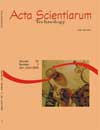Analysis of the problem with chang phase
Abstract
The present work aims the employment of the boundary elements method for the solution to the one-dimensional solidification problem in Cartesian coordinates. The boundary elements method transforms the original problem, which was the resolution of a partial differential equation, for the solution to a system of non linear equations, and it has as unknows the front position of freezing and the flows of heat at each one of the extremities. The results obtained with the numeric simulations were compared with a problem that presents analytic solution. The method employed showed fast and efficient for the solution to the problem investigated, and the agreement was verified between the result obtained with numeric solution and the one with analytic solution. The analysis showed that the boundary elements method was efficient for the solution to the problem of change phase, and the proposed methodology can be applied for more complex situations that do not present analytic solutionDownloads
Download data is not yet available.
Published
2008-03-27
How to Cite
Johann, G., & Silva, E. A. da. (2008). Analysis of the problem with chang phase. Acta Scientiarum. Technology, 27(2), 111-117. https://doi.org/10.4025/actascitechnol.v27i2.1454
Issue
Section
Chemical Engineering
DECLARATION OF ORIGINALITY AND COPYRIGHTS
I Declare that current article is original and has not been submitted for publication, in part or in whole, to any other national or international journal.
The copyrights belong exclusively to the authors. Published content is licensed under Creative Commons Attribution 3.0 (CC BY 3.0) guidelines, which allows sharing (copy and distribution of the material in any medium or format) and adaptation (remix, transform, and build upon the material) for any purpose, even commercially, under the terms of attribution.
Read this link for further information on how to use CC BY 3.0 properly.
0.8
2019CiteScore
36th percentile
Powered by 



0.8
2019CiteScore
36th percentile
Powered by 



















